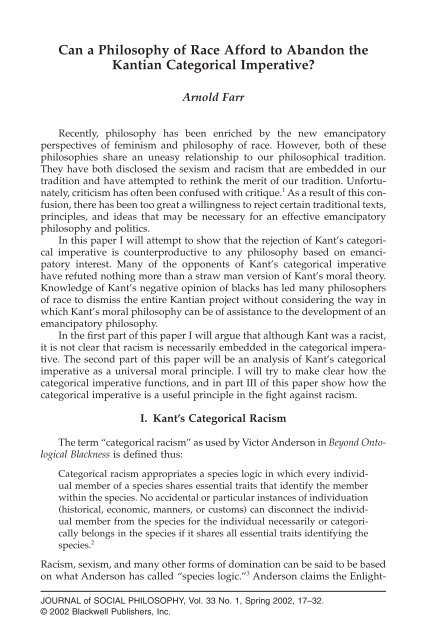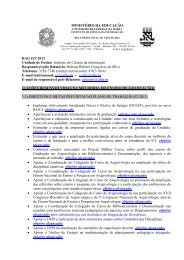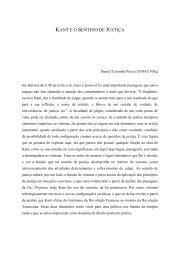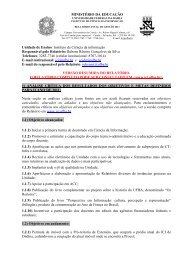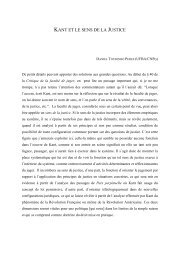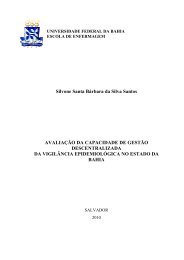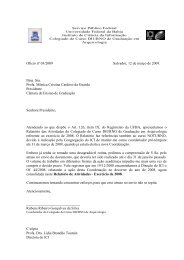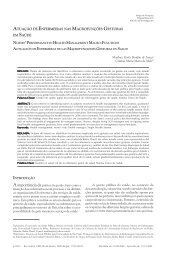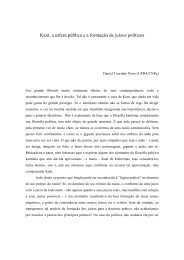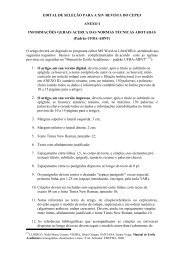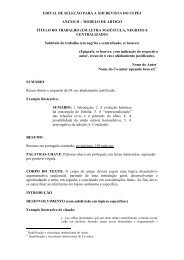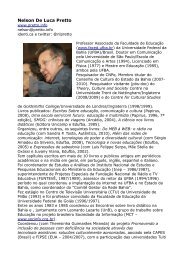Can a Philosophy of Race Afford to Abandon the Kantian ...
Can a Philosophy of Race Afford to Abandon the Kantian ...
Can a Philosophy of Race Afford to Abandon the Kantian ...
- No tags were found...
You also want an ePaper? Increase the reach of your titles
YUMPU automatically turns print PDFs into web optimized ePapers that Google loves.
<strong>Can</strong> a <strong>Philosophy</strong> <strong>of</strong> <strong>Race</strong> <strong>Afford</strong> <strong>to</strong> <strong>Abandon</strong> <strong>the</strong><strong>Kantian</strong> Categorical Imperative?Arnold FarrRecently, philosophy has been enriched by <strong>the</strong> new emancipa<strong>to</strong>ryperspectives <strong>of</strong> feminism and philosophy <strong>of</strong> race. However, both <strong>of</strong> <strong>the</strong>sephilosophies share an uneasy relationship <strong>to</strong> our philosophical tradition.They have both disclosed <strong>the</strong> sexism and racism that are embedded in ourtradition and have attempted <strong>to</strong> rethink <strong>the</strong> merit <strong>of</strong> our tradition. Unfortunately,criticism has <strong>of</strong>ten been confused with critique. 1 As a result <strong>of</strong> this confusion,<strong>the</strong>re has been <strong>to</strong>o great a willingness <strong>to</strong> reject certain traditional texts,principles, and ideas that may be necessary for an effective emancipa<strong>to</strong>ryphilosophy and politics.In this paper I will attempt <strong>to</strong> show that <strong>the</strong> rejection <strong>of</strong> Kant’s categoricalimperative is counterproductive <strong>to</strong> any philosophy based on emancipa<strong>to</strong>ryinterest. Many <strong>of</strong> <strong>the</strong> opponents <strong>of</strong> Kant’s categorical imperativehave refuted nothing more than a straw man version <strong>of</strong> Kant’s moral <strong>the</strong>ory.Knowledge <strong>of</strong> Kant’s negative opinion <strong>of</strong> blacks has led many philosophers<strong>of</strong> race <strong>to</strong> dismiss <strong>the</strong> entire <strong>Kantian</strong> project without considering <strong>the</strong> way inwhich Kant’s moral philosophy can be <strong>of</strong> assistance <strong>to</strong> <strong>the</strong> development <strong>of</strong> anemancipa<strong>to</strong>ry philosophy.In <strong>the</strong> first part <strong>of</strong> this paper I will argue that although Kant was a racist,it is not clear that racism is necessarily embedded in <strong>the</strong> categorical imperative.The second part <strong>of</strong> this paper will be an analysis <strong>of</strong> Kant’s categoricalimperative as a universal moral principle. I will try <strong>to</strong> make clear how <strong>the</strong>categorical imperative functions, and in part III <strong>of</strong> this paper show how <strong>the</strong>categorical imperative is a useful principle in <strong>the</strong> fight against racism.I. Kant’s Categorical RacismThe term “categorical racism” as used by Vic<strong>to</strong>r Anderson in Beyond On<strong>to</strong>logicalBlackness is defined thus:Categorical racism appropriates a species logic in which every individualmember <strong>of</strong> a species shares essential traits that identify <strong>the</strong> memberwithin <strong>the</strong> species. No accidental or particular instances <strong>of</strong> individuation(his<strong>to</strong>rical, economic, manners, or cus<strong>to</strong>ms) can disconnect <strong>the</strong> individualmember from <strong>the</strong> species for <strong>the</strong> individual necessarily or categoricallybelongs in <strong>the</strong> species if it shares all essential traits identifying <strong>the</strong>species. 2Racism, sexism, and many o<strong>the</strong>r forms <strong>of</strong> domination can be said <strong>to</strong> be basedon what Anderson has called “species logic.” 3 Anderson claims <strong>the</strong> Enlight-JOURNAL <strong>of</strong> SOCIAL PHILOSOPHY, Vol. 33 No. 1, Spring 2002, 17–32.© 2002 Blackwell Publishers, Inc.
18 Arnold Farrenment and Romantic cultures <strong>of</strong> eighteenth- and nineteenth-centuryScotland, Germany, and France developed a philosophy <strong>of</strong> difference thatdifferentiated European consciousness from o<strong>the</strong>rs. 4 “European intellectualssought <strong>to</strong> disclose European genius as an explana<strong>to</strong>ry category for <strong>the</strong> progressive,his<strong>to</strong>rical movement <strong>of</strong> <strong>the</strong> modern age.” 5 Anderson and o<strong>the</strong>rs areright in <strong>the</strong>ir claim that Kant’s racist attitude is based on a form <strong>of</strong> “specieslogic.” Indeed, <strong>the</strong> Enlightenment itself is permeated with racist attitudes andattempts <strong>to</strong> scientifically justify such attitudes.In On Human Diversity: Nationalism, Racism, and Exoticism in FrenchThought, Tzvetan Todorov examines <strong>the</strong> development <strong>of</strong> scientific racism in<strong>the</strong> French Enlightenment. Scientific racism is based on “species logic” ins<strong>of</strong>aras it attempts <strong>to</strong> prove <strong>the</strong> inferiority <strong>of</strong> non-European races and <strong>the</strong>rebyranks groups <strong>of</strong> people in such a way that Europeans are viewed as <strong>the</strong>highest manifestation <strong>of</strong> humanity, whereas o<strong>the</strong>r groups are relegated <strong>to</strong> asubhuman status. In such a scheme, Europeans embody <strong>the</strong> universal, <strong>the</strong>ideal <strong>of</strong> humanity. 6 This notion has led many contemporary <strong>the</strong>orists <strong>to</strong> reject<strong>the</strong> notion <strong>of</strong> <strong>the</strong> ideal humanity or universal values since <strong>the</strong>se values are byand large European. The problem may be stated in terms <strong>of</strong> <strong>the</strong> followingpropositions:Proposition 1.Proposition 2.Proposition 3.Proposition 4.Proposition 5.Europeans embody <strong>the</strong> highest principles and values <strong>of</strong>humanity, and are <strong>the</strong> most intelligent <strong>of</strong> <strong>the</strong> species.All o<strong>the</strong>r races are subhuman <strong>to</strong> <strong>the</strong> extent that <strong>the</strong>ydo not fully embody <strong>the</strong> intelligence and values that arecharacteristic <strong>of</strong> humanity in its highest form.O<strong>the</strong>r races do embody an undeveloped human essencethat must be cultivated and perfected.Since Europeans embody <strong>the</strong> most perfected form <strong>of</strong>humanity, <strong>the</strong>y will determine <strong>the</strong> course <strong>of</strong> his<strong>to</strong>ry (<strong>the</strong>progress <strong>of</strong> humanity).Non-European races should submit <strong>the</strong>mselves <strong>to</strong> <strong>the</strong>ideal, <strong>the</strong> cultured, <strong>the</strong> bearers <strong>of</strong> his<strong>to</strong>ry, <strong>the</strong> whiteEuropean male.These five propositions sum up categorical racism and are consistent withKant’s attitude in Observations on <strong>the</strong> Feeling <strong>of</strong> <strong>the</strong> Beautiful and Sublime. In thistext Kant makes several claims about <strong>the</strong> inferiority <strong>of</strong> African people. One<strong>of</strong> <strong>the</strong> passages cited by Anderson and also discussed by Cornel West 7 readsas follows:The Negroes <strong>of</strong> Africa have by nature no feeling that rises above <strong>the</strong> trifling.Mr. Hume challenges anyone <strong>to</strong> cite a single example in which aNegro has shown talents, and asserts that among <strong>the</strong> hundreds <strong>of</strong>thousands <strong>of</strong> blacks who are transported elsewhere from <strong>the</strong>ir countries,although many <strong>of</strong> <strong>the</strong>m have been set free, still not a single one was everfound who presented anything great in art or science or any o<strong>the</strong>r praiseworthyquality, even though among <strong>the</strong> whites some continually riseal<strong>of</strong>t from <strong>the</strong> lowest rabble, and through superior gifts earn respect in
<strong>Philosophy</strong> <strong>of</strong> <strong>Race</strong> and <strong>the</strong> Categorical Imperative 19<strong>the</strong> world. So fundamental is <strong>the</strong> difference between <strong>the</strong>se two races <strong>of</strong>man, and it appears <strong>to</strong> be as great in regard <strong>to</strong> mental capacities as incolor. 8This passage shows that Kant is guilty <strong>of</strong> “categorical racism.” That is, allpeople <strong>of</strong> African descent are relegated <strong>to</strong> one single category and devaluedas a group. No consideration is given <strong>to</strong> possible individual differences, his<strong>to</strong>ricalcircumstances, etc. People <strong>of</strong> African descent are thought <strong>to</strong> be bynature inferior <strong>to</strong> whites. That Kant was a racist is by no means contestedhere. The issue that I want <strong>to</strong> raise is whe<strong>the</strong>r universal values and principlesshould be abandoned because <strong>of</strong> his racism.In “Talkin’ That Talk,” an essay written as a response <strong>to</strong> TzvetanTodorov’s essay “<strong>Race</strong> Writing and Culture,” Henry Louis Gates writes:As I try <strong>to</strong> show in my book, Black Letters and <strong>the</strong> Enlightenment, racismand—dare I say it?—logocentrism marched arm in arm <strong>to</strong> delimit blackpeople in perhaps <strong>the</strong> most pernicious way <strong>of</strong> all: <strong>to</strong> claim that <strong>the</strong>y weresubhuman, that <strong>the</strong>y were “a different species <strong>of</strong> men,” as Hume put itso plainly, because <strong>the</strong>y could not “write” literature. Did Kant s<strong>to</strong>p beinga racist, s<strong>to</strong>p thinking that <strong>the</strong>re existed a natural, predetermined relationbetween “stupidity” and “blackness” (his terms) just because hewrote Foundations <strong>of</strong> <strong>the</strong> Metaphysics <strong>of</strong> Morals? Hardly! Indeed, one mightsay that Kant’s Observations on <strong>the</strong> Feeling <strong>of</strong> <strong>the</strong> Beautiful and Sublime functions<strong>to</strong> deconstruct, for <strong>the</strong> black reader, Kant’s Foundations, revealingit <strong>to</strong> be just one more example <strong>of</strong> <strong>the</strong> remarkable capacity <strong>of</strong> Europeanphilosophers <strong>to</strong> conceive <strong>of</strong> “humanity” in ideal terms (white, male), yetdespise, abhor, colonize, or exploit human beings who are not “ideal.” 9Gates continues his attack on Todorov by suggesting <strong>the</strong> Todorov has “reproducedan ideology <strong>of</strong> egalitarianism and universalism which seeks <strong>to</strong> bracket<strong>the</strong> soundings <strong>of</strong> <strong>the</strong> critical voice <strong>of</strong> <strong>the</strong> O<strong>the</strong>r.” 10 Ano<strong>the</strong>r attack on <strong>Kantian</strong>universal principles comes from Lewis R. Gordon in Bad Faith and AntiblackRacism. Gordon writes:A straightforward problem is Kant’s requirement that in order <strong>to</strong> respecthuman beings we must look beyond human beings <strong>to</strong> abstract versions<strong>of</strong> <strong>the</strong>m as rational beings. The whole point <strong>of</strong> antiracism is, however, <strong>to</strong>demand that members <strong>of</strong> <strong>the</strong> disrespected race be respected as <strong>the</strong>y “are,”in <strong>the</strong> flesh, so <strong>to</strong> speak. 11This attack on universalism is quite common in race and feminist literature.Such literature sets itself up as a critical “o<strong>the</strong>r” that keeps in check oppressiveuniversal principles constructed by white males.Although it is necessary <strong>to</strong> approach any values that claim universalvalidity with caution, it is also necessary that we maintain a posture <strong>of</strong> criticalself-reflection. It appears <strong>to</strong> me that much <strong>of</strong> what parades as critique isan uncritical criticism. The adoption <strong>of</strong> a new language (<strong>the</strong> so-called language<strong>of</strong> critique) does not assure one <strong>of</strong> a genuinely critical stance. The attack
20 Arnold Farron universalism may be as uncritical as a thoughtless universalism. Many <strong>of</strong><strong>the</strong> opponents <strong>of</strong> universalism seem <strong>to</strong> be unaware <strong>of</strong> <strong>the</strong> consequences <strong>of</strong><strong>the</strong>ir position. That is, how is any <strong>the</strong>ory that advocates equality, emancipation,justice, fairness, etc., possible without some universal standard? In <strong>the</strong>remainder <strong>of</strong> this paper I will show that a critical philosophy <strong>of</strong> race requiresa universal principle, and that <strong>the</strong> <strong>Kantian</strong> categorical imperative providessuch a principle.II. Thinking beyond <strong>the</strong> Particular:The Categorical Imperative as a Universal Moral PrincipleThe criticisms <strong>of</strong> Kant’s categorical imperative put forth by <strong>the</strong> abovementioned<strong>the</strong>orists seem <strong>to</strong> be based on a fundamental misunderstanding<strong>of</strong> <strong>the</strong> point <strong>of</strong> such a principle. The categorical imperative is generally dismissedbecause <strong>of</strong> its universal status alone. In <strong>the</strong> literature on race onewould be hard pressed <strong>to</strong> find a careful analysis <strong>of</strong> what Kant was up <strong>to</strong> in<strong>the</strong> Grounding. Kant’s actual arguments are never addressed. The validity andusefulness <strong>of</strong> a universal principle such as <strong>the</strong> categorical imperative must bedetermined by a close examination <strong>of</strong> <strong>the</strong> <strong>the</strong>oretical context in which <strong>the</strong>principle was developed. The conspectus <strong>of</strong> this paper does not allow for athorough analysis <strong>of</strong> <strong>the</strong> categorical imperative and its many formulations.Here I will examine only <strong>the</strong> demand <strong>of</strong> universality made by <strong>the</strong> categoricalimperative, and I will attempt <strong>to</strong> show that such a demand is not anti<strong>the</strong>tical<strong>to</strong> emancipa<strong>to</strong>ry <strong>the</strong>ories <strong>of</strong> race, but ra<strong>the</strong>r, is a necessary ingredient<strong>of</strong> such <strong>the</strong>ories.Some years ago <strong>the</strong>re was a debate among Kant scholars as <strong>to</strong> whe<strong>the</strong>r<strong>the</strong> categorical imperative was descriptive or prescriptive. 12 By “descriptive”I mean that <strong>the</strong> categorical imperative merely described <strong>the</strong> workings <strong>of</strong> purepractical reason. On this account <strong>the</strong> Grounding would be something like aphenomenology <strong>of</strong> moral consciousness. It merely describes what happenswhen moral decisions are made. By “prescriptive” I mean that <strong>the</strong> categoricalimperative is presented as a principle that ought <strong>to</strong> be employed in <strong>the</strong>act <strong>of</strong> moral decision making. The case can be made that both are present in<strong>the</strong> Grounding. However, it is not my intention here <strong>to</strong> defend such a claim. Isimply want <strong>to</strong> show that on both accounts, <strong>the</strong> demand for universalizabilityis necessary and can be helpful in an emancipa<strong>to</strong>ry philosophy <strong>of</strong> race.I will first examine <strong>the</strong> demand for universalizability on <strong>the</strong> descriptiveaccount. The prescriptive account is <strong>the</strong> same, with <strong>the</strong> exception that it doesnot describe <strong>the</strong> nature <strong>of</strong> moral decision making but prescribes a principlefor moral decision making. In <strong>the</strong> very act <strong>of</strong> making a moral decision <strong>the</strong>reis an appeal <strong>to</strong> some universal principle. To this extent, moral decisionmaking requires a moment <strong>of</strong> self-transcendence. This notion <strong>of</strong> selftranscendenceis an inseparable, essential aspect <strong>of</strong> moral decision making.The recognition <strong>of</strong> <strong>the</strong> act <strong>of</strong> self-transcendence in <strong>the</strong> act <strong>of</strong> moral decisionmaking is captured in <strong>the</strong> <strong>Kantian</strong> notion <strong>of</strong> duty. On <strong>the</strong> descriptiveaccount <strong>of</strong> <strong>the</strong> categorical imperative we simply recognize that every act <strong>of</strong>moral decision making entails an appeal <strong>to</strong> duty. There are everyday acts thatdo not require an appeal <strong>to</strong> duty. Such acts are merely prudent. For example,
<strong>Philosophy</strong> <strong>of</strong> <strong>Race</strong> and <strong>the</strong> Categorical Imperative 21if I want a nice lawn <strong>the</strong>n I will mow it. Such a decision employs a hypo<strong>the</strong>ticalimperative. I have no moral duty <strong>to</strong> mow my lawn since I have noduty <strong>to</strong> have a nice lawn. However, I do have a duty <strong>to</strong> not <strong>to</strong>rture o<strong>the</strong>rhuman beings. Not only do I have a duty <strong>to</strong> not <strong>to</strong>rture o<strong>the</strong>r people, it seemsclear <strong>to</strong> me that no one should <strong>to</strong>rture o<strong>the</strong>r people. Therefore, I will not<strong>to</strong>rture o<strong>the</strong>rs. My decision <strong>to</strong> not <strong>to</strong>rture o<strong>the</strong>rs may make me unhappy, sinceI may enjoy <strong>to</strong>rturing o<strong>the</strong>rs. Never<strong>the</strong>less, I have a duty <strong>to</strong> not <strong>to</strong>rture o<strong>the</strong>rs,<strong>the</strong>refore, I must overcome this urge <strong>to</strong> <strong>to</strong>rture o<strong>the</strong>rs; I must transcend mysensual desire.For Kant, moral decision making requires an appeal <strong>to</strong> a principle that ishigher than my own particular maxims. My subjective maxim (seek pleasureat all times) must be held in check by some higher principle. This higherprinciple demands that I transcend my own personal desires if <strong>the</strong>se desiresconflict with morality. The categorical imperative is <strong>the</strong> principle wherebyI transcend <strong>the</strong> particularities <strong>of</strong> my own sensual nature and consider what Iought <strong>to</strong> do ra<strong>the</strong>r than what I want <strong>to</strong> do. That is, I must broaden my perspectiveby considering <strong>the</strong> perspective <strong>of</strong> o<strong>the</strong>r rational beings.A. Universal Principles and Concrete Situations:A Possible Rebuttal?One <strong>of</strong> <strong>the</strong> most popular criticisms <strong>of</strong> Kant’s moral philosophy is that itis <strong>to</strong>o formalistic. 13 That is, <strong>the</strong> universal nature <strong>of</strong> <strong>the</strong> categorical imperativeleaves it devoid <strong>of</strong> content. Such a principle is useless since moral decisionsare made by concrete individuals in a concrete, his<strong>to</strong>rical, and social situation.This type <strong>of</strong> criticism lies behind Lewis Gordon’s rejection <strong>of</strong> any attempt<strong>to</strong> ground an antiracist position on <strong>Kantian</strong> principles. The rejection <strong>of</strong> universalprinciples for <strong>the</strong> sake <strong>of</strong> emphasizing <strong>the</strong> his<strong>to</strong>rical embeddednes <strong>of</strong><strong>the</strong> human agent is widespread in recent philosophy and social <strong>the</strong>ory. I willargue here on <strong>Kantian</strong> grounds that although a distinction between <strong>the</strong> universaland <strong>the</strong> concrete is a valid distinction, <strong>the</strong> unity <strong>of</strong> <strong>the</strong> two is requiredfor an understanding <strong>of</strong> human agency.The attack on <strong>Kantian</strong> formalism began with Hegel’s criticism <strong>of</strong> <strong>the</strong><strong>Kantian</strong> philosophy. 14 The list <strong>of</strong> contemporary <strong>the</strong>orists who follow Hegel’sline <strong>of</strong> criticism is far <strong>to</strong>o long <strong>to</strong> deal with in <strong>the</strong> scope <strong>of</strong> this paper. Although<strong>the</strong>se <strong>the</strong>orists may approach <strong>the</strong> problem <strong>of</strong> <strong>Kantian</strong> formalism from a variety<strong>of</strong> angles, <strong>the</strong> spirit <strong>of</strong> <strong>the</strong>ir criticism is basically <strong>the</strong> same: The universality <strong>of</strong><strong>the</strong> categorical imperative is an abstraction from one’s empirical conditions.Kant is <strong>of</strong>ten accused <strong>of</strong> making <strong>the</strong> moral agent an abstract, empty, noumenalsubject. Nothing could be fur<strong>the</strong>r from <strong>the</strong> truth. The <strong>Kantian</strong> subject is anembodied, empirical, concrete subject. However, this concrete subject has adual nature. Kant claims in <strong>the</strong> Critique <strong>of</strong> Pure Reason as well as in <strong>the</strong> Groundingthat human beings have an intelligible and empirical character. 15 It isimpossible <strong>to</strong> understand and do justice <strong>to</strong> Kant’s moral <strong>the</strong>ory without takingseriously <strong>the</strong> relation between <strong>the</strong>se two characters. The very concept <strong>of</strong>morality is impossible without <strong>the</strong> tension between <strong>the</strong> two.By “empirical character” Kant simply means that we have a sensualnature. We are physical creatures with physical drives or desires. The very
22 Arnold Farrfact that I cannot simply satisfy my desires without considering <strong>the</strong> rightnessor wrongness <strong>of</strong> my actions suggests that my empirical character must beheld in check by something, or else I behave like a Freudian id. My empiricalcharacter must be held in check by my intelligible character, which is <strong>the</strong>legislative activity <strong>of</strong> practical reason.It is through our intelligible character that we formulate principlesthat keep our empirical impulses in check. The categorical imperative is <strong>the</strong>supreme principle <strong>of</strong> morality that is constructed by <strong>the</strong> moral agent inhis/her moment <strong>of</strong> self-transcendence. What I have called self-transcendencemay be best explained in <strong>the</strong> following passage by Onora O’Neill:In restricting our maxims <strong>to</strong> those that meet <strong>the</strong> test <strong>of</strong> <strong>the</strong> categoricalimperative we refuse <strong>to</strong> base our lives on maxims that necessarily makeour own case an exception. The reason why a universilizability criterionis morally significant is that it makes our own case no special exception(G, IV, 404). In accepting <strong>the</strong> Categorical Imperative we accept <strong>the</strong> moralreality <strong>of</strong> o<strong>the</strong>r selves, and hence <strong>the</strong> possibility (not, note, <strong>the</strong> reality) <strong>of</strong>a moral community. The Formula <strong>of</strong> Universal Law enjoins no more thanthat we act only on maxims that are open <strong>to</strong> o<strong>the</strong>rs also. 16O’Neill’s description <strong>of</strong> <strong>the</strong> universalizability criterion includes <strong>the</strong> notion <strong>of</strong>self-transcendence that I am working <strong>to</strong> explicate here <strong>to</strong> <strong>the</strong> extent that likeself-transcendence, universalizable moral principles require that <strong>the</strong> individualthink beyond his or her own particular desires. The individual is notallowed <strong>to</strong> exclude o<strong>the</strong>rs as rational moral agents who have <strong>the</strong> right <strong>to</strong> actas he acts in a given situation. For example, if I decide <strong>to</strong> use ano<strong>the</strong>r personmerely as a means for my own end I must recognize <strong>the</strong> o<strong>the</strong>r person’s right<strong>to</strong> do <strong>the</strong> same <strong>to</strong> me. I cannot consistently will that I use ano<strong>the</strong>r as a meansonly and will that I not be used in <strong>the</strong> same manner by ano<strong>the</strong>r. Hence, <strong>the</strong>universalizability criterion is a principle <strong>of</strong> consistency and a principle <strong>of</strong>inclusion. That is, in choosing my maxims I attempt <strong>to</strong> include <strong>the</strong> perspective<strong>of</strong> o<strong>the</strong>r moral agents.B. Is <strong>the</strong> Categorical Imperative a Racist Principle?The above criticism <strong>of</strong> Kant by Gordon oversimplifies Kant’s position.Gordon’s criticism is based on <strong>the</strong> possibility that one can hate humanity yetstill act out <strong>of</strong> duty <strong>to</strong>wards humanity. This is true. I do not have <strong>to</strong> care abouta person <strong>to</strong> treat him in a way that is demanded by <strong>the</strong> moral law. The result,it seems, is love for some abstract idea <strong>of</strong> humanity and no love for concreteindividual people. This criticism, however, is a bit misguided. It imposes on<strong>the</strong> categorical imperative a binary opposition between concrete and abstracthumanity. The real opposition, or better yet, apposition is between subjectiveand objective maxims. What is generally taken <strong>to</strong> be abstract in Kant’s moralphilosophy is its emphasis on objectivity. But this emphasis on objectivity isnot an attempt <strong>to</strong> dismiss concrete humanity, but ra<strong>the</strong>r <strong>to</strong> include humanityin general in our moral decision-making processes.
<strong>Philosophy</strong> <strong>of</strong> <strong>Race</strong> and <strong>the</strong> Categorical Imperative 23Most criticisms <strong>of</strong> <strong>the</strong> objective status <strong>of</strong> <strong>the</strong> categorical imperative arebased on <strong>the</strong> assumption that objective principles are abstract and <strong>the</strong>reforeempty. However, although objective principles <strong>of</strong> <strong>the</strong> <strong>Kantian</strong> sort require anact <strong>of</strong> abstraction, <strong>the</strong>y are far from empty. Critics <strong>of</strong> Kant’s moral philosophybelieve that <strong>the</strong> categorical imperative is empty because it lacks empiricalcontent. However, this criticism misses <strong>the</strong> point. Many critics <strong>of</strong> Kant’smoral philosophy <strong>of</strong>ten read Kant’s Grounding for <strong>the</strong> Metaphysics <strong>of</strong> Moralsout <strong>of</strong> its philosophical context. That is, all <strong>of</strong> Kant’s critical writings are permeatedwith a view <strong>of</strong> <strong>the</strong> structure <strong>of</strong> human consciousness that must beconsidered when reading his moral philosophy. As early as <strong>the</strong> Critique <strong>of</strong> PureReason Kant makes a distinction between our empirical and intelligible character,which forms <strong>the</strong> basis <strong>of</strong> his moral philosophy. It is that part <strong>of</strong> consciousness(intelligible character) that legislates by means <strong>of</strong> principles thatis taken <strong>to</strong> be empty by critics <strong>of</strong> Kant. However, what does empty mean here?It seems that “empty” merely means nonempirical. For Kant, moral principlesare intelligible content and are produced by rational thought.Lewis Gordon criticizes Kant on <strong>the</strong> basis that <strong>Kantian</strong> morality requiresthat we look beyond human beings <strong>to</strong> some abstract version <strong>of</strong> <strong>the</strong>m asrational beings. 17 If Gordon is right, <strong>the</strong>n Kant’s moral philosophy denies <strong>the</strong>possibility <strong>of</strong> morality <strong>to</strong> <strong>the</strong> extent that morality requires a sensual nature(embodiment). For Kant, human beings are finite, sensual, concrete, empirical,rational beings. Like many o<strong>the</strong>r critics <strong>of</strong> Kant, Gordon overlooks Kant’semphasis on human finitude (embodiment). Kant clearly states that althoughwe are members <strong>of</strong> <strong>the</strong> intelligible world, we are also members <strong>of</strong> <strong>the</strong> world<strong>of</strong> sense. 18 However, I take it that what is problematic for Gordon is <strong>the</strong> ideathat <strong>the</strong> o<strong>the</strong>r person is worthy <strong>of</strong> respect on <strong>the</strong> basis <strong>of</strong> his or her membershipin <strong>the</strong> rational world. This may be <strong>of</strong>fensive <strong>to</strong> race-conscious personsbecause one can be hated as a member <strong>of</strong> a particular race but treated in arespectful manner because one is a rational being. However, it seems <strong>to</strong> methat racism is based on a failure <strong>to</strong> recognize members <strong>of</strong> o<strong>the</strong>r races as rationalagents worthy <strong>of</strong> respect. 19Gordon’s criticism <strong>of</strong> <strong>Kantian</strong> morality expresses two fears that are characteristic<strong>of</strong> contemporary criticisms <strong>of</strong> Kant. First, Kant’s notion <strong>of</strong> <strong>the</strong> objectivityand universalizability <strong>of</strong> moral principles is abstract and does notconsider <strong>the</strong> concrete, his<strong>to</strong>rical situation <strong>of</strong> <strong>the</strong> moral agent. Second, <strong>the</strong><strong>Kantian</strong> notion <strong>of</strong> rationality is a Eurocentric concept, that is, it applies <strong>to</strong>white European males. The first <strong>of</strong> <strong>the</strong>se concerns is expressed in <strong>the</strong> followingpassage:Kant can, for instance, have a moral misanthrope who can hate humanity<strong>to</strong> his heart’s content as long as he acts fundamentally from dutyin-itself.That is because <strong>the</strong> moral law ultimately stands above, in <strong>the</strong>sense <strong>of</strong> having priority <strong>of</strong> value over, human beings. For <strong>the</strong> humanistwho wishes <strong>to</strong> remain <strong>Kantian</strong>, <strong>the</strong> only way out is <strong>to</strong> situate humanityon a meta-ethical level above <strong>the</strong> moral law as its constituter, whichdefeats <strong>the</strong> whole point <strong>of</strong> its categorical formulation. It wouldn’t evenwork <strong>to</strong> make this meta-ethical level an identity-relation between humanityand <strong>the</strong> Moral Law, for <strong>the</strong>n humanity would have <strong>to</strong> be shown <strong>to</strong> be
24 Arnold Farressentially constituted in virtue <strong>of</strong> its form, a task that would be destined<strong>to</strong> fail in any encounter with embodiments <strong>of</strong> rationality that areregarded as contingent. One would have <strong>to</strong> argue not only that <strong>the</strong>re isa human nature, but also that rationality is identical with that nature; ino<strong>the</strong>r words, not only that human being “is” rational being, but also thatrational being is human being, a conclusion that Kant clearly rejects. 20Gordon continues:Rationality is a relation in this scheme from “above” <strong>to</strong> “below.” Theracist has no problem with abstract humanity, which he both regards as“above” and concedes is already manifest by himself and his group. 21The first <strong>of</strong> <strong>the</strong> above passages contains several instances <strong>of</strong> a fundamentalmisunderstanding <strong>of</strong> <strong>Kantian</strong> moral philosophy. The second draws aconclusion that is true <strong>of</strong> a racist, Eurocentric attitude but is not necessarilytrue <strong>of</strong> <strong>Kantian</strong> moral philosophy. My response <strong>to</strong> Gordon will begin with ananalysis <strong>of</strong> four interpretive problems found in <strong>the</strong> first <strong>of</strong> <strong>the</strong> above passages.After making clear Kant’s position, we must see if such a position is inherentlyracist, or if <strong>Kantian</strong> moral philosophy can be used <strong>to</strong> combat racism.The four interpretive problems that I will discuss are first, <strong>the</strong> problematicnotion <strong>of</strong> duty; second, <strong>the</strong> priority <strong>of</strong> <strong>the</strong> moral law over humanity; third,<strong>the</strong> problem <strong>of</strong> <strong>the</strong> constitution <strong>of</strong> <strong>the</strong> moral law; and finally, <strong>the</strong> problem <strong>of</strong><strong>the</strong> identity <strong>of</strong> rationality and human nature.1. Duty Is Not Just for Duty’s SakeTo critics, one <strong>of</strong> <strong>the</strong> most revolting concepts in Kant’s moral philosophyis <strong>the</strong> concept <strong>of</strong> duty. According <strong>to</strong> many interpreters <strong>the</strong> <strong>Kantian</strong> concept <strong>of</strong>duty is a cold, calculating, inhuman concept. Kant doesn’t help matters byclaiming that we ought <strong>to</strong> do our duty for duty’s sake. Indeed, it seems as if<strong>the</strong>re is some inhuman, abstract principle that all humanity must submit <strong>to</strong>,hence, denying our humanity. However, <strong>the</strong> concept <strong>of</strong> duty is much morecomplex and much richer than it appears. The concept <strong>of</strong> duty arises out <strong>of</strong>what many critics <strong>of</strong> Kant claim that Kant denies. That is, <strong>the</strong> concept <strong>of</strong> dutyis not derived from some abstract notion <strong>of</strong> rational humanity, ra<strong>the</strong>r, it isbased on our concrete, finite existence, which includes rationality. The concept<strong>of</strong> duty is derived from our recognition <strong>of</strong> two conflicting feelings that areconstitutive <strong>of</strong> morality. We feel that we are free and yet we are limited. Thistension between freedom and necessity permeates Kant’s entire criticalphilosophy. Indeed, it is Kant’s preoccupation in all three Critiques and <strong>the</strong>Grounding. Hence, Kant’s moral philosophy must be read in <strong>the</strong> context <strong>of</strong>Kant’s entire critical project. To discuss <strong>the</strong> <strong>Kantian</strong> concept <strong>of</strong> duty separatefrom some discussion <strong>of</strong> his notion <strong>of</strong> freedom could only lead <strong>to</strong> a misrepresentation<strong>of</strong> Kant’s moral philosophy, since freedom is <strong>the</strong> key concept inKant’s moral <strong>the</strong>ory. The notion <strong>of</strong> duty must be unders<strong>to</strong>od in its relation t<strong>of</strong>reedom, rationality, and willing.
<strong>Philosophy</strong> <strong>of</strong> <strong>Race</strong> and <strong>the</strong> Categorical Imperative 25For Kant, rational creatures are simply creatures that are not entirelydetermined by sensuous impulses. Morality is as function <strong>of</strong> rationality <strong>to</strong><strong>the</strong> extent that as moral agents we strive <strong>to</strong> make our sensuous impulses conform<strong>to</strong> some higher principle. It seems obvious that at times our sensuousimpulses must be restricted. It may be argued that even racism is based onone’s failure <strong>to</strong> control one’s sensuous impulses, that is, one’s impulses ordesire <strong>to</strong> dominate and oppress ano<strong>the</strong>r group. If <strong>the</strong> racist is <strong>to</strong> cease beinga racist, he must change his or her way <strong>of</strong> thinking about those <strong>of</strong> a differentrace, that is, he must choose ano<strong>the</strong>r way <strong>of</strong> being. This choice is based onsome higher principle, such as that it is wrong <strong>to</strong> discriminate against o<strong>the</strong>rs<strong>of</strong> <strong>the</strong> basis <strong>of</strong> racial difference. This principle takes on an objective, universalstatus when <strong>the</strong> former racist concludes that “all persons ought notdiscriminate against o<strong>the</strong>rs on <strong>the</strong> basis <strong>of</strong> racial (physical) difference.” Thisprinciple is a maxim that determines <strong>the</strong> behavior <strong>of</strong> <strong>the</strong> person invoking <strong>the</strong>maxim. To <strong>the</strong> extent that such a principle should apply <strong>to</strong> all persons at alltimes it is a duty.One may re<strong>to</strong>rt, “<strong>the</strong> above maxim determines <strong>the</strong> behavior <strong>of</strong> <strong>the</strong> onewho holds such a maxim but it does not change <strong>the</strong> way that one feels aboutpeople <strong>of</strong> o<strong>the</strong>r races, that is, one may decide that it is wrong <strong>to</strong> discriminateagainst blacks but may still hate blacks.” There are two approaches that onemay take in addressing this rebuttal. First, one may point out that this maximis still subject <strong>to</strong> a higher principle, for example, “it is wrong <strong>to</strong> hate peopleon <strong>the</strong> basis <strong>of</strong> racial difference.” This principle is still problematic <strong>to</strong> <strong>the</strong>extent that although one may know that it is wrong <strong>to</strong> hate o<strong>the</strong>rs on <strong>the</strong> basis<strong>of</strong> racial difference, one may still hate o<strong>the</strong>rs <strong>of</strong> different races. However, Kantmakes it clear that morality is not based on what we like or find desirable.Morality <strong>of</strong>ten comes in<strong>to</strong> conflict with our feelings and desires. What is rightmay not be what we find pleasant, hence, duty is <strong>the</strong> obligation <strong>to</strong> do whatis right even if one does not find it pleasant. For example, duty is my recognition<strong>of</strong> my obligation not <strong>to</strong> <strong>to</strong>rture my neighbor even if such an act wouldbring me great pleasure. Feelings are not bound by <strong>the</strong> moral law in that Ihave no control over <strong>the</strong>m. However, I do have control over <strong>the</strong> way in whichI respond <strong>to</strong> my feelings.This brings us <strong>to</strong> <strong>the</strong> second way in which one may address <strong>the</strong> aboverebuttal. In <strong>the</strong> Grounding, Kant claims that <strong>the</strong> only thing that is good withoutqualification is a good will. 22 The cultivation <strong>of</strong> a good will is <strong>the</strong> central <strong>the</strong>me<strong>of</strong> <strong>the</strong> Grounding. We hope that right action will follow from a good will, butthis opens up a whole new set <strong>of</strong> problems. In recognizing that <strong>the</strong> will is <strong>the</strong>only thing that is good without qualification, Kant recognizes that althoughwe are not completely determined by <strong>the</strong> sensible impulses, we are, indeed,influenced by <strong>the</strong>m. That is, as members <strong>of</strong> <strong>the</strong> intelligible world we arecapable <strong>of</strong> transcending <strong>the</strong> sensible world <strong>to</strong> <strong>the</strong> extent that we can will whatis not <strong>the</strong> case but ought <strong>to</strong> be <strong>the</strong> case. For example, even in <strong>the</strong> absence <strong>of</strong>justice in <strong>the</strong> sensible world we can envision a just society and strive <strong>to</strong>produce such. However, as members <strong>of</strong> <strong>the</strong> sensible world <strong>the</strong>re are manylimitations and contingencies that interfere with our ability <strong>to</strong> produce a justsociety. As finite, imperfect beings, our reality does not measure up <strong>to</strong> ourconcept <strong>of</strong> what ought <strong>to</strong> be <strong>the</strong> case. Even <strong>the</strong> person who wills a nonracist
26 Arnold Farrsociety may from time <strong>to</strong> time find himself harboring racist feelings. Yet thisperson still feels duty-bound <strong>to</strong> transform society on <strong>the</strong> basis <strong>of</strong> <strong>the</strong> rational,ideal, abstract principle <strong>of</strong> a nonracist society.Gordon’s criticism also seems <strong>to</strong> imply that one should do good not fromduty but from love <strong>of</strong> humanity. This seems <strong>to</strong> make emotion primary. If thisis <strong>the</strong> case, not only does Gordon misunderstand Kant, but he misunderstands<strong>the</strong> nature <strong>of</strong> morality in general. Kant’s emphasis on duty is due <strong>to</strong>his recognition <strong>of</strong> <strong>the</strong> instability <strong>of</strong> feelings or emotion. Not that one shouldshun feelings, but feelings and emotions tend <strong>to</strong> fluctuate. For example, onemay feel kindly disposed <strong>to</strong> members <strong>of</strong> ano<strong>the</strong>r race <strong>to</strong>day and ill disposed<strong>to</strong> <strong>the</strong> members <strong>of</strong> that race <strong>to</strong>morrow. Since feelings are subject <strong>to</strong> changesporadically, <strong>the</strong>y cannot be <strong>the</strong> basis for morality. Kant does recognize that<strong>the</strong>re are moral endowments such as moral feeling, love <strong>of</strong> one’s neighbor,conscience, and respect that one has no obligation <strong>to</strong> have. 23 However, <strong>the</strong>reare duties that may lead <strong>to</strong> <strong>the</strong> acquisition and cultivation <strong>of</strong> <strong>the</strong>se moralendowments. For example, Kant claims that love is a matter <strong>of</strong> feeling not<strong>of</strong> willing. I cannot love someone by merely willing that I love someone.Never<strong>the</strong>less, “benevolence as conduct, can be subject <strong>to</strong> a law <strong>of</strong> duty.” 24Kant writes:Beneficence is a duty. If someone practices it <strong>of</strong>ten and succeeds in realizinghis beneficent intention, he eventually comes actually <strong>to</strong> love <strong>the</strong>person he has helped. So <strong>the</strong> saying “you ought <strong>to</strong> love your neighbor asyourself” does not mean that you ought immediately (first) <strong>to</strong> love himand (afterwards) by means <strong>of</strong> this love do good <strong>to</strong> him. It means, ra<strong>the</strong>r,do good <strong>to</strong> your fellow man, and your beneficence will produce love <strong>of</strong>man in you (as an aptitude <strong>of</strong> <strong>the</strong> inclination <strong>to</strong> beneficence in general). 25But why is duty important? Is <strong>the</strong>re some end <strong>to</strong>ward which duty propels us?2. Humanity as an EndThis brings us <strong>to</strong> our second interpretive problem, that is, that manycritics <strong>of</strong> Kant have lamented that Kant makes humanity subject <strong>to</strong> someexternal, inhuman moral principle. Gordon raises this very point. The general<strong>to</strong>ne <strong>of</strong> <strong>the</strong> Grounding can lead one <strong>to</strong> conclude that some abstract moral lawhas priority over human beings. However, <strong>the</strong> truth is that <strong>the</strong>re is nothingthat has priority over humanity.A more careful and consistent reading <strong>of</strong> Kant’s texts reveals that<strong>the</strong> moral law serves humanity. It is <strong>the</strong> function <strong>of</strong> <strong>the</strong> moral law <strong>to</strong> perfecthumanity. The perfection <strong>of</strong> humanity is a <strong>the</strong>me that runs through many <strong>of</strong>Kant’s works. 26 The moral law as developed in Kant’s philosophy must beunders<strong>to</strong>od in terms <strong>of</strong> freedom and <strong>the</strong> perfection <strong>of</strong> humanity. One mayre<strong>to</strong>rt that it is <strong>the</strong> idea <strong>of</strong> <strong>the</strong> perfection <strong>of</strong> humanity that undergirds categoricalracism or species logic <strong>to</strong> <strong>the</strong> extent that for Kant and o<strong>the</strong>r eighteenthcenturywhite European males, <strong>the</strong>y were <strong>the</strong> most perfect members <strong>of</strong> <strong>the</strong>human race and <strong>the</strong>y held <strong>the</strong> key for <strong>the</strong> fur<strong>the</strong>r perfection <strong>of</strong> <strong>the</strong> human race.Although this may be true at one level <strong>of</strong> analysis, it is not sufficient grounds
<strong>Philosophy</strong> <strong>of</strong> <strong>Race</strong> and <strong>the</strong> Categorical Imperative 27for rejecting <strong>the</strong> idea <strong>of</strong> <strong>the</strong> perfection <strong>of</strong> humanity. If <strong>the</strong> term “perfection” is<strong>of</strong>fensive we may instead talk about <strong>the</strong> improvement <strong>of</strong> humanity.It seems reasonable <strong>to</strong> say that all persons interested in emancipation,justice, radical politics, etc., are interested in <strong>the</strong> improvement <strong>of</strong> humanity.Philosophers <strong>of</strong> race, feminists, and critical social <strong>the</strong>orists work under <strong>the</strong>assumption that humanity in its present state is not what it ought <strong>to</strong> be. Thegoal <strong>of</strong> emancipa<strong>to</strong>ry movements and <strong>the</strong>ories is <strong>to</strong> bring in<strong>to</strong> existence a state<strong>of</strong> affairs that ameliorates <strong>the</strong> human condition. Hence, we may reject <strong>the</strong> ideathat a certain group represents humanity in its most perfect form, but it wouldbe self-defeating <strong>to</strong> reject <strong>the</strong> idea <strong>of</strong> <strong>the</strong> perfection (improvement) <strong>of</strong> humanityin general.3. The Constitution <strong>of</strong> <strong>the</strong> Moral LawThe problem <strong>of</strong> situating humanity above <strong>the</strong> moral law as its constituteris no problem at all. In <strong>the</strong> Grounding Kant performs a conceptual analysis <strong>of</strong>morality. He seeks <strong>to</strong> discover <strong>the</strong> necessary features <strong>of</strong> moral judgments. Tothis extent his project is descriptive and not merely prescriptive. Kant’s analysisis transcendental <strong>to</strong> <strong>the</strong> extent that he seeks <strong>to</strong> discover <strong>the</strong> necessary conditionsfor morality. It is <strong>the</strong> conditions for morality that Kant discovers thatare <strong>of</strong>ten treated superficially by his critics.One <strong>of</strong> <strong>the</strong> necessary conditions for morality is au<strong>to</strong>nomy. BernardCarnois claims that “<strong>the</strong> idea <strong>of</strong> au<strong>to</strong>nomy will provide us with a key <strong>to</strong> <strong>the</strong>explanation <strong>of</strong> <strong>the</strong> transcendental possibility <strong>of</strong> <strong>the</strong> categorical imperative.” 27By au<strong>to</strong>nomy Kant simply means freedom <strong>of</strong> <strong>the</strong> will. However, this freedomis not spontaneity but is a law-governed freedom. 28 Au<strong>to</strong>nomy is <strong>the</strong> propertythat <strong>the</strong> will has <strong>of</strong> being a law un<strong>to</strong> itself. 29 To be au<strong>to</strong>nomous is <strong>to</strong> have<strong>the</strong> capacity <strong>to</strong> will or attempt <strong>to</strong> produce a state <strong>of</strong> affairs. For example, whena racist decides <strong>to</strong> be a nonracist, he or she resists his or her inclinations <strong>to</strong>remain racist. In a racist society one may be pathologically or psychologicallypredisposed <strong>to</strong> racist attitudes and behaviors. 30 We act au<strong>to</strong>nomously whenwe are affected by impulses and inclinations but refuse <strong>to</strong> be determined by<strong>the</strong>m. In acting au<strong>to</strong>nomously we give ourselves a law such as: “AlthoughI’ve been raised <strong>to</strong> be a racist, no one should be a racist, <strong>the</strong>refore, I will resistmy inclination <strong>to</strong> be a racist.” The person who realizes or decides that racismis wrong constructs or constitutes a law whereby he or she will govern his orher actions and attitudes. This person freely wills that racism become extinct.The law that this person gives <strong>to</strong> himself is categorical in that it is universal,that is, it is not a subjective but an objective maxim that should apply <strong>to</strong>everyone.4. The Identity <strong>of</strong> Rationality and HumanityThe problem entailed in this fourth interpretive problem (i.e., <strong>the</strong> problem<strong>of</strong> an identity-relation between humanity and <strong>the</strong> moral law) is in Kant’sphilosophy not an identity-relation between humanity and a moral law thatis external <strong>to</strong> <strong>the</strong> human being. Ra<strong>the</strong>r, Kant’s philosophy discloses a divisionor disunity within human consciousness. However, <strong>the</strong> two sides <strong>of</strong> human
28 Arnold Farrconsciousness must constitute an identity-relation <strong>to</strong> <strong>the</strong> extent that <strong>the</strong>y aretwo sides <strong>of</strong> one and <strong>the</strong> same consciousness or two poles <strong>of</strong> one and <strong>the</strong> sameconsciousness. 31 The very concept <strong>of</strong> morality is produced through <strong>the</strong> striving<strong>of</strong> consciousness <strong>to</strong> unify itself. It is in a single consciousness that <strong>the</strong> laws<strong>of</strong> freedom and <strong>the</strong> laws <strong>of</strong> nature are in conflict. If according <strong>to</strong> Kant, humanitywas constituted solely in virtue <strong>of</strong> its form (as Gordon suggests), thistension between <strong>the</strong> laws <strong>of</strong> freedom and <strong>the</strong> laws <strong>of</strong> nature would not bepossible, hence, <strong>the</strong> very concept <strong>of</strong> morality would be null and void. It isprecisely because we are embodied rationality that <strong>the</strong>re is in human consciousnessa disunity that our rational or intelligible character seeks <strong>to</strong> unify.The moral law is <strong>the</strong> principle whereby we seek consistency and unity in <strong>the</strong>production <strong>of</strong> and arrangement <strong>of</strong> maxims.In <strong>the</strong> above I have already responded <strong>to</strong> <strong>the</strong> third problem discussed byGordon. Human nature is not identical <strong>to</strong> rationality but is partially constitutedby rationality. The human being can be moral only <strong>to</strong> <strong>the</strong> extent that<strong>the</strong> human being is partially rational but seeks <strong>to</strong> be fully rational. Pure rationalityis a goal which we can only approximate but never achieve because weremain tied <strong>to</strong> our sensual nature.III. The Categorical Imperative asFirst Principle <strong>of</strong> a <strong>Philosophy</strong> <strong>of</strong> <strong>Race</strong>There are two dangers <strong>to</strong> be confronted in this section. First, in <strong>the</strong> earlytwenty-first century it is not fashionable <strong>to</strong> speak <strong>of</strong> first principles. Second,it may seem a bit bold <strong>to</strong> suggest that <strong>the</strong> moral philosophy <strong>of</strong> a racist shouldserve as a first principle for a philosophy <strong>of</strong> race. The problem <strong>of</strong> first principlesin contemporary philosophy cannot be discussed within <strong>the</strong> conspectus<strong>of</strong> this paper. However, <strong>the</strong>re must be some point <strong>of</strong> reference, someArchimedian point that holds <strong>to</strong>ge<strong>the</strong>r <strong>the</strong> multiplicity <strong>of</strong> perspectives, if anytype <strong>of</strong> solidarity is <strong>to</strong> be acquired. The second problem should be less problematicin light <strong>of</strong> <strong>the</strong> above discussion or internal critique <strong>of</strong> Kant’s moralphilosophy. What is left for us <strong>to</strong> do here is <strong>to</strong> attempt <strong>to</strong> think in terms <strong>of</strong>how <strong>the</strong> categorical imperative may actually be applied <strong>to</strong> <strong>the</strong> problem <strong>of</strong>racism.Whereas most criticisms are aimed at <strong>the</strong> formulation <strong>of</strong> universal lawand <strong>the</strong> formula <strong>of</strong> au<strong>to</strong>nomy, our analysis here will focus on <strong>the</strong> formula <strong>of</strong>an end in itself and <strong>the</strong> formula <strong>of</strong> <strong>the</strong> kingdom <strong>of</strong> ends, since we have alreadyaddressed <strong>the</strong> problem <strong>of</strong> universality. The latter will be discussed first.At issue here is what Kant means by “kingdom <strong>of</strong> ends.” Kant writes: “By‘kingdom’ I understand a systematic union <strong>of</strong> different rational beingsthrough common laws.” 32 The above passage indicates that Kant recognizesdifferent, perhaps different kinds, <strong>of</strong> rational beings; however, <strong>the</strong> problem formost critics <strong>of</strong> Kant lies in <strong>the</strong> assumption that Kant suggests that <strong>the</strong>“kingdom <strong>of</strong> ends” requires that we abstract from personal differences andcontent <strong>of</strong> private ends. The <strong>Kantian</strong> conception <strong>of</strong> rational beings requiressuch an abstraction. Some feminists and philosophers <strong>of</strong> race have found thisabstract notion <strong>of</strong> rational beings problematic because <strong>the</strong>y take it <strong>to</strong> mean
<strong>Philosophy</strong> <strong>of</strong> <strong>Race</strong> and <strong>the</strong> Categorical Imperative 29that rationality is necessarily white, male, and European. 33 Hence, <strong>the</strong> systematicunion <strong>of</strong> rational beings can mean only <strong>the</strong> systematic union <strong>of</strong> white,European males.I find this interpretation <strong>of</strong> Kant’s moral <strong>the</strong>ory quite puzzling. Surelyano<strong>the</strong>r interpretation is available. That is, <strong>the</strong> implication that in Kant’s philosophy,rationality can only apply <strong>to</strong> white, European males does not seem<strong>to</strong> be <strong>the</strong> only alternative. The problem seems <strong>to</strong> lie in <strong>the</strong> requirement <strong>of</strong>abstraction. There are two ways <strong>of</strong> looking at <strong>the</strong> abstraction requirement thatI think are faithful <strong>to</strong> Kant’s text and that overcome <strong>the</strong> criticisms <strong>of</strong> thisrequirement. First, <strong>the</strong> abstraction requirement may be best unders<strong>to</strong>od as ademand for intersubjectivity or recognition. Second, it may be unders<strong>to</strong>od asan attempt <strong>to</strong> avoid ethical egoism in determining maxims for our actions.It is unfortunate that Kant never worked out a <strong>the</strong>ory <strong>of</strong> intersubjectivity,as did his successors Fichte and Hegel. However, this is not <strong>to</strong> say that<strong>the</strong>re is not in Kant’s philosophy a tacit <strong>the</strong>ory <strong>of</strong> intersubjectivity or recognition.The abstraction requirement simply demands that in <strong>the</strong> midst <strong>of</strong> ourconcrete differences we recognize ourselves in <strong>the</strong> o<strong>the</strong>r and <strong>the</strong> o<strong>the</strong>r inourselves. That is, we recognize in o<strong>the</strong>rs <strong>the</strong> humanity that we have in common.Recognition <strong>of</strong> our common humanity is at <strong>the</strong> same time recognition<strong>of</strong> rationality in <strong>the</strong> o<strong>the</strong>r. We recognize in <strong>the</strong> o<strong>the</strong>r <strong>the</strong> capacity for selfdeterminationand <strong>the</strong> capacity <strong>to</strong> legislate for a kingdom <strong>of</strong> ends.This brings us <strong>to</strong> <strong>the</strong> second interpretation <strong>of</strong> <strong>the</strong> abstraction requirement.To avoid ethical egoism one must abstract from (think beyond) one’s ownpersonal interest and subjective maxims. That is, <strong>the</strong> categorical imperativerequires that I recognize that I am a member <strong>of</strong> <strong>the</strong> realm <strong>of</strong> rational beings.Hence, I organize my maxims in consideration <strong>of</strong> o<strong>the</strong>r rational beings. Undersuch a principle o<strong>the</strong>r people cannot be treated merely as a means for my endbut must be treated as ends in <strong>the</strong>mselves.The merit <strong>of</strong> <strong>the</strong> categorical imperative for a philosophy <strong>of</strong> race is that itcontravenes racist ideology <strong>to</strong> <strong>the</strong> extent that racist ideology is based on <strong>the</strong>use <strong>of</strong> persons <strong>of</strong> a different race as a means <strong>to</strong> an end ra<strong>the</strong>r than as ends in<strong>the</strong>mselves. Embedded in <strong>the</strong> formulation <strong>of</strong> an end in itself and <strong>the</strong> formula<strong>of</strong> <strong>the</strong> kingdom <strong>of</strong> ends is <strong>the</strong> recognition <strong>of</strong> <strong>the</strong> common hope for humanity.That is, maxims ought <strong>to</strong> be chosen on <strong>the</strong> basis <strong>of</strong> an ideal, a hope for <strong>the</strong>amelioration <strong>of</strong> humanity. This ideal or ethical commonwealth (as Kant callsit in <strong>the</strong> Religion) is <strong>the</strong> kingdom <strong>of</strong> ends. 34Although <strong>the</strong> merits <strong>of</strong> Kant’s moral <strong>the</strong>ory may be recognizable at thispoint, we are still in a bit <strong>of</strong> a bind. It still seems problematic that <strong>the</strong> moral<strong>the</strong>ory <strong>of</strong> a racist is essentially an antiracist <strong>the</strong>ory. Fur<strong>the</strong>r, what shall wedo with Henry Louis Gates’s suggestion that we use <strong>the</strong> Observations on <strong>the</strong>Feeling <strong>of</strong> <strong>the</strong> Beautiful and Sublime <strong>to</strong> deconstruct <strong>the</strong> Grounding? What I havetried <strong>to</strong> suggest is that instead <strong>of</strong> abandoning <strong>the</strong> categorical imperative weshould attempt <strong>to</strong> deepen our understanding <strong>of</strong> it and its place in Kant’s criticalphilosophy. A deeper reading <strong>of</strong> <strong>the</strong> Grounding and Kant’s philosophy ingeneral may produce <strong>the</strong> deconstruction 35 suggested by Gates. However, atext is not necessarily deconstructed by reading it against ano<strong>the</strong>r. Texts <strong>of</strong>tendeconstruct <strong>the</strong>mselves if read properly. To be sure, <strong>the</strong> best way <strong>to</strong> under-
30 Arnold Farrstand a text is <strong>to</strong> read it in context. Hence, if <strong>the</strong> Grounding is read within <strong>the</strong>context <strong>of</strong> <strong>the</strong> critical philosophy, <strong>the</strong> <strong>to</strong>ols for a deconstruction <strong>of</strong> <strong>the</strong> text areprovided by its context and <strong>the</strong> tensions within <strong>the</strong> text.Gates is right <strong>to</strong> suggest that <strong>the</strong> Grounding must be deconstructed.However, this deconstruction requires much more than reading <strong>the</strong> Observationson <strong>the</strong> Feeling <strong>of</strong> <strong>the</strong> Beautiful and Sublime against <strong>the</strong> Grounding. It requiresa complete engagement with <strong>the</strong> critical philosophy. Such an engagementdiscloses some <strong>of</strong> Kant’s very significant claims about humanity and <strong>the</strong>practical role <strong>of</strong> reason. With this disclosure, deconstruction <strong>of</strong> <strong>the</strong> Groundingcan begin. What deconstruction will reveal is not necessarily <strong>the</strong> inconsistency<strong>of</strong> Kant’s moral philosophy or <strong>the</strong> racist or sexist nature <strong>of</strong> <strong>the</strong> categoricalimperative, but ra<strong>the</strong>r, it will disclose <strong>the</strong> disunity between Kant’s <strong>the</strong>oryand his own feelings about blacks and women. Although <strong>the</strong> <strong>the</strong>ory is consistentand emancipa<strong>to</strong>ry and should apply <strong>to</strong> all persons, Kant <strong>the</strong> man hashis own personal and moral problems. Although Kant’s attitude <strong>to</strong>wardpeople <strong>of</strong> African descent was deplorable, it would be equally deplorable <strong>to</strong>reject <strong>the</strong> categorical imperative without first exploring its emancipa<strong>to</strong>rypotential.Notes1 I follow Seyla Benhabib (who draws on Marx) in pointing out this distinction between“critique” and “criticism.” She writes: “Critique refuses <strong>to</strong> stand outside its object andinstead juxtaposes <strong>the</strong> immanent, normative self-understanding <strong>of</strong> its object <strong>to</strong> <strong>the</strong>material actuality <strong>of</strong> <strong>the</strong> object. Criticism privileges an Archimedian standpoint, be itfreedom, or reason and proceeds <strong>to</strong> show <strong>the</strong> unfreedom or unreasonableness <strong>of</strong> <strong>the</strong>world when measured against this ideal paradigm” (Critique Norm and U<strong>to</strong>pia: A Study<strong>of</strong> <strong>the</strong> Foundations <strong>of</strong> Critical Theory, New York: Columbia University Press, 1986, 33). Mypurpose in evoking this distinction here is <strong>to</strong> show that many critics <strong>of</strong> Kant rejectKant’s moral <strong>the</strong>ory on <strong>the</strong> basis <strong>of</strong> an external critique or criticism. However, such aprocedure fails <strong>to</strong> do justice <strong>to</strong> <strong>the</strong> <strong>the</strong>ory and leads <strong>to</strong> an unnecessary dismissal <strong>of</strong> <strong>the</strong>categorical imperative. This problematic rejection <strong>of</strong> Kant’s highest moral principle isexacerbated by <strong>the</strong> fact that <strong>the</strong>re is textual evidence that Kant was a racist and sexist.However, a critique gives us <strong>the</strong> grounds for rejecting Kant’s racism and sexism whilepreserving what I take <strong>to</strong> be Kant’s indispensable contribution <strong>to</strong> moral <strong>the</strong>ory and anyemancipa<strong>to</strong>ry philosophy.2 Vic<strong>to</strong>r Anderson, Beyond On<strong>to</strong>logical Blackness: An Essay on African American Religious andCultural Criticism (New York: Continuum, 1995), 51.3 Anderson’s use <strong>of</strong> <strong>the</strong> term “species logic” is a bit confusing but need not be. The term“species” can be used <strong>to</strong> distinguish <strong>the</strong> human species from o<strong>the</strong>r species, and it canbe used <strong>to</strong> distinguish types within a species. Anderson makes use <strong>of</strong> <strong>the</strong> latter function<strong>of</strong> <strong>the</strong> term. However, in racist literature <strong>the</strong>re is a blurring <strong>of</strong> <strong>the</strong>se two functions<strong>of</strong> <strong>the</strong> term. One may argue that it is <strong>to</strong> this blurring <strong>of</strong> <strong>the</strong> functions <strong>of</strong> <strong>the</strong> term“species” that <strong>the</strong> term “species logic” applies. That is, although <strong>the</strong> human race is aparticular species, in racist literature <strong>the</strong>re is a hiearchy within <strong>the</strong> species that almostaccounts for a plurality <strong>of</strong> species types within a species. Hence, <strong>the</strong>re is <strong>the</strong> morehuman and <strong>the</strong> less human.4 Ibid., 51–52.5 Ibid., 52.6 See chapter 2 <strong>of</strong> Tzvetan Todorov’s On Human Diversity: Nationalism, Racism, and Exoticismin French Thought, trans. Ca<strong>the</strong>rine Porter (Cambridge/London: Harvard UniversityPress, 1994).
<strong>Philosophy</strong> <strong>of</strong> <strong>Race</strong> and <strong>the</strong> Categorical Imperative 317 See chapter 2 <strong>of</strong> Cornel West’s Prophesy Deliverance! An Afro-American RevolutionaryChristianity (Philadelphia: Westminster, 1982).8 Anderson, Beyond On<strong>to</strong>logical Blackness, 54.9 Henry Louis Gates, “Talkin’ That Talk,” in “<strong>Race</strong>,” Writing and Difference, ed. Henry LouisGates (Chicago and London: University <strong>of</strong> Chicago Press, 1986), 408.10 Ibid.11 Lewis R. Gordon, Bad Faith and Antiblack Racism (Atlantic Highlands, N.J.: Humanities,1995), 68.12 T. C. Williams discusses this debate between H. J. Pa<strong>to</strong>n and A. C. R. Duncan in TheConcept <strong>of</strong> <strong>the</strong> Categorical Imperative: A Study <strong>of</strong> <strong>the</strong> Place <strong>of</strong> <strong>the</strong> Categorical Imperative inKant’s Ethical Theory (Oxford: Clarendon, 1968).13 See Andrea Austen’s “A Feminist Reconstruction <strong>of</strong> Bradley’s Ethical Idealism,” IdealisticStudies 26, no. 1 (Winter/Spring 1996): 17–28.14 See “<strong>Kantian</strong> <strong>Philosophy</strong>,” in G. W. F. Hegel’s Faith and Knowledge, trans. Walter Cerf andH. S. Harris (Albany: State University <strong>of</strong> New York Press, 1977), 67–96.15 This antinomy between our intelligible and empirical character is constitutive <strong>of</strong> humanmoral agency. See section 3 <strong>of</strong> Kant’s Grounding for <strong>the</strong> Metaphysics <strong>of</strong> Morals, trans.James W. Elling<strong>to</strong>n (Indianapolis/Cambridge: Hackett, 1993). See also A451/B569 inKant’s Critique <strong>of</strong> Pure Reason, trans. Norman Kemp Smith (New York: St. Martin’s,1965).16 Onora O’ Neill, Constructions <strong>of</strong> Reason: Explorations <strong>of</strong> Kant’s Practical <strong>Philosophy</strong> (NewYork: Cambridge University Press, 1989), 156.17 Gordon, Bad Faith, 68.18 Kant, Grounding, 61.19 One possible objection <strong>to</strong> my <strong>the</strong>sis in this paper is that <strong>the</strong> <strong>Kantian</strong> notion <strong>of</strong> rationalityexcludes women and nonwhite races. This is true on <strong>the</strong> basis <strong>of</strong> Kant’s own racismand sexism. However, it seems <strong>to</strong> me that Kant’s notion <strong>of</strong> rationality is itself not wrong.Kant is wrong only <strong>to</strong> <strong>the</strong> extent that he thinks that it applies only <strong>to</strong> white Europeanmales.20 Gordon, Bad Faith, 68–69.21 Ibid., 69.22 Kant. Grounding, 7.23 Immanuel Kant, The Metaphysics <strong>of</strong> Morals, trans. Mary Gregor (New York: CambridgeUniversity Press, 1991), 200.24 Ibid., 203.25 Ibid.26 Here I am thinking <strong>of</strong> <strong>the</strong> notion <strong>of</strong> purposiveness that Kant develops in <strong>the</strong> Critique <strong>of</strong>Judgment and in “Conjectures on <strong>the</strong> Beginning <strong>of</strong> Human His<strong>to</strong>ry.”27 Bernard Carnois, The Coherence <strong>of</strong> Kant’s Doctrine <strong>of</strong> Freedom, trans. David Booth (Chicagoand London: University <strong>of</strong> Chicago Press, 1987), 47.28 Henry Allison makes <strong>the</strong> important distinction between freedom as spontaneity andfreedom as law governed au<strong>to</strong>nomy in “Spontaneity and Au<strong>to</strong>nomy in Kant’s Conception<strong>of</strong> <strong>the</strong> Self,” in The Modern Subject: Conceptions <strong>of</strong> <strong>the</strong> Self in Classical German<strong>Philosophy</strong>, ed. Karl Ameriks and Dieter Sturma (Albany: State University <strong>of</strong> New YorkPress, 1995), 11–29.29 Kant, Grounding, 49.30 For a discussion <strong>of</strong> this notion <strong>of</strong> a pathological and psychological predisposition, seeHenry Allison’s Kant’s Theory <strong>of</strong> Freedom (Cambridge and New York: Cambridge UniversityPress, 1990), 55. See also A534/B562 in Kant’s Critique <strong>of</strong> Pure Reason.31 To say that <strong>the</strong> two sides <strong>of</strong> consciousness constitute an identity-relation is not <strong>to</strong> say that<strong>the</strong>y are identical <strong>to</strong> each o<strong>the</strong>r. They are quite distinct. However, <strong>the</strong> individual subjectis <strong>the</strong> unity <strong>of</strong> two conflicting feelings, that is, <strong>the</strong> feeling <strong>of</strong> necessity (our empiricalcharacter) and <strong>the</strong> feeling <strong>of</strong> freedom (our intelligible character). Herein is <strong>the</strong> <strong>Kantian</strong>distinction between <strong>the</strong>oretical and practical reason.32 Kant, Grounding, 39.33 The criticism <strong>of</strong> <strong>Kantian</strong> rationality, universality, and au<strong>to</strong>nomy is quite extensive infeminist philosophy. Much <strong>of</strong> this criticism has emerged since <strong>the</strong> publication <strong>of</strong> Carol
32 Arnold FarrGilligan’s In a Different Voice (Cambridge and London: Harvard University Press, 1982).The following may be useful in helping <strong>the</strong> reader <strong>to</strong> understand <strong>the</strong> nature <strong>of</strong> this feministcriticism: Justice and Care: Essential Readings in Feminist Ethics, ed. Virginia Held(Boulder, Colo.: Westview, 1995); Susan Hekman, “Moral Voices, Moral Selves: AboutGetting It Right in Moral Theory,” Human Studies 16 (1993): 143–62; and Austen, “AFeminist Reconstruction.”34 Kant, Religion within <strong>the</strong> Limits <strong>of</strong> Reason Alone, trans. Theodore Greene and Hoyt Hudson(New York: Harper Torchbooks, 1960), 89.35 Gates does not clarify what he means by <strong>the</strong> term “deconstruct.” It is clear from many<strong>of</strong> Gates’s works that he has been influenced by Derrida and perhaps some <strong>of</strong> hisAmerican followers. John D. Capu<strong>to</strong> (one <strong>of</strong> Derrida’s leading American interpreters)says <strong>of</strong> deconstruction: “The very meaning and mission <strong>of</strong> deconstruction is <strong>to</strong> showthat things—texts, institutions, societies, beliefs, and practices <strong>of</strong> whatever size and sortyou need—do not have definable meanings and determinable missions, that <strong>the</strong>y arealways more than any mission would impose, that <strong>the</strong>y exceed <strong>the</strong> boundaries <strong>the</strong>ycurrently occupy. What is really going on in things, what is really happening is always<strong>to</strong> come. Every time you try <strong>to</strong> stabilize <strong>the</strong> meaning <strong>of</strong> a thing, <strong>to</strong> fix it in its missionaryposition, <strong>the</strong> thing itself, if <strong>the</strong>re is anything <strong>to</strong> it, it slips away. A ‘meaning’ or a‘mission’ is a way <strong>to</strong> contain and compact things, like a nutshell, ga<strong>the</strong>ring <strong>the</strong>m in<strong>to</strong>a unity, whereas deconstruction bends all its efforts <strong>to</strong> stretch beyond <strong>the</strong>se boundaries,<strong>to</strong> transgress <strong>the</strong>se confines, <strong>to</strong> interrupt and disjoin all such ga<strong>the</strong>ring” (JacquesDerrida and John Capu<strong>to</strong>, Deconstruction in a Nutshell: A Conversation with JacquesDerrida, New York: Fordham University Press, 1997, 31–32). Deconstruction pits itselfagainst any <strong>the</strong>ory that purports <strong>to</strong> have achieved unity and closure in its analysis <strong>of</strong>a given object. Kant’s universal moral principle is <strong>the</strong> target here. To deconstruct Kant’suniversal moral principle is <strong>to</strong> show that such a principle is not complete, nor can it becomplete. Any attempt <strong>to</strong> bring closure <strong>to</strong> a system is characterized by an exclusion <strong>of</strong>o<strong>the</strong>rs. For Gates, Kant’s moral <strong>the</strong>ory and his understanding <strong>of</strong> rationality appliedonly <strong>to</strong> white, male Europeans.


